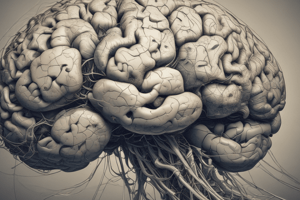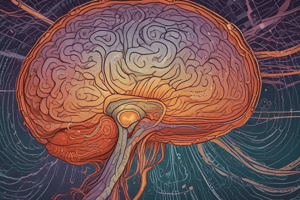Podcast
Questions and Answers
What is the main difference between ocular blindness and cortical blindness?
What is the main difference between ocular blindness and cortical blindness?
- Ocular blindness is caused by brain dysfunction, while cortical blindness is caused by eye dysfunction.
- Ocular blindness results from damage to the frontal cortex, while cortical blindness results from damage to the temporal cortex.
- Ocular blindness affects the occipital cortex, while cortical blindness affects the parietal cortex.
- Ocular blindness is caused by eye dysfunction, while cortical blindness is caused by brain dysfunction. (correct)
Which pathway of the visual system is responsible for 'What' processing?
Which pathway of the visual system is responsible for 'What' processing?
- Dorsal pathway to the parietal cortex
- Dorsal pathway to the temporal cortex
- Ventral pathway to the temporal cortex (correct)
- Ventral pathway to the parietal cortex
Visual information processes in greater detail in which part of the brain?
Visual information processes in greater detail in which part of the brain?
- Frontal cortex
- Occipital cortex (correct)
- Parietal cortex
- Temporal cortex
Which type of lesion would primarily affect landmark discrimination?
Which type of lesion would primarily affect landmark discrimination?
What does cortical blindness refer to?
What does cortical blindness refer to?
Which part of the brain processes 'Where' information in the visual system?
Which part of the brain processes 'Where' information in the visual system?
Which pathway is disrupted in a patient with visual neglect?
Which pathway is disrupted in a patient with visual neglect?
Visual agnosia results from damage to which part of the brain?
Visual agnosia results from damage to which part of the brain?
What is disrupted in a patient with visual agnosia?
What is disrupted in a patient with visual agnosia?
In the visual system, the retina is responsible for:
In the visual system, the retina is responsible for:
Which part of the visual system is described as a 'waystation'?
Which part of the visual system is described as a 'waystation'?
Which part of the brain is the primary termination point for Optic Tract fibers?
Which part of the brain is the primary termination point for Optic Tract fibers?
What type of lesion results in blindness in the contralateral visual field?
What type of lesion results in blindness in the contralateral visual field?
Which area of the brain deals with complex aspects of vision and can result in visual agnosia if lesioned?
Which area of the brain deals with complex aspects of vision and can result in visual agnosia if lesioned?
A lesion that results in blindness of the right eye belongs to which type of defect?
A lesion that results in blindness of the right eye belongs to which type of defect?
Where are upper visual fields projected in the brain?
Where are upper visual fields projected in the brain?
Which structure within the optic tract projections is responsible for pupillary light reflexes?
Which structure within the optic tract projections is responsible for pupillary light reflexes?
Flashcards are hidden until you start studying
Study Notes
Pathways of Visual Processing
- Ocular blindness results from issues in the eye or dealing with the optic nerve; cortical blindness results from damage to the visual cortex.
- The ventral pathway, known as the "what" pathway, is responsible for processing object identification and recognition in the visual system.
- Visual information is processed in greater detail in the primary visual cortex (V1) and associated visual areas.
Lesion Effects on Visual Perception
- A lesion in the dorsal pathway, the "where" processing stream, would primarily affect landmark discrimination, impacting spatial awareness and movement coordination.
- Cortical blindness refers to the loss of vision due to disruptions in the visual processing areas of the brain, despite functional eyes and optic nerves.
- The parietal lobe processes "where" information, aiding in understanding an object's location and spatial relationships in the visual field.
- A patient with visual neglect has disrupted connections in the dorsal pathway, leading to an inability to attend to stimuli on one side of space.
Visual Agnosia and Processing
- Visual agnosia results from damage to the inferior temporal cortex, impairing visual recognition despite intact vision.
- In visual agnosia, the ability to recognize objects, faces, or scenes is disrupted, while visual acuity remains intact.
Basic Functionality of the Visual System
- The retina transforms light signals into neural signals, initiating the visual processing pathway.
- The thalamus acts as a 'waystation,' relaying sensory information, including visual input, to the appropriate areas of the cortex.
- The primary visual cortex (V1) is the main termination point for optic tract fibers, where visual processing begins.
Impact of Lesions and Projections
- A lesion in the visual cortex can lead to homonymous hemianopsia, resulting in blindness in the contralateral visual field.
- The occipitotemporal region deals with complex aspects of vision; damage here can lead to profound visual agnosia.
- Lesions resulting in blindness of the right eye are categorized as retrobulbar or optic nerve defects, affecting visual input before reaching the brain.
- Upper visual fields are projected to the lower part of the primary visual cortex due to the inverted orientation of the visual field.
- The pretectal area within the optic tract projections is responsible for mediating pupillary light reflexes, crucial for controlling pupil size in response to light.
Studying That Suits You
Use AI to generate personalized quizzes and flashcards to suit your learning preferences.




